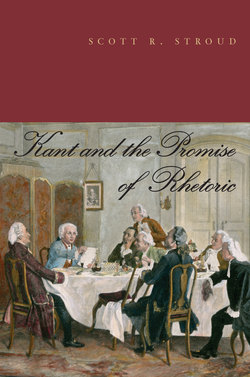Kant and the Promise of Rhetoric

Реклама. ООО «ЛитРес», ИНН: 7719571260.
Оглавление
Scott R. Stroud. Kant and the Promise of Rhetoric
Отрывок из книги
KANT AND THE PROMISE OF RHETORIC
Kant and the Promise of Rhetoric
.....
The most defensible route would be to recognize that the concept of communicatively interacting with others extends beyond one way of inflecting the practices of persuading others. What often misleads us are the simplifications and choices necessarily involved in translation and interpretation. Beredsamkeit is translated in the Critique of the Power of Judgment as “rhetoric” and, more important, as a practice that entails manipulation. Nearby, however, Eloquenz and Rhetorik are used and translated as “eloquence” and “rhetoric” in nonmanipulative senses. Beredsamkeit could as easily been translated as “eloquence.” Clearly, the larger genus of “skilled speaking” or eloquence is relevant to Kant’s moral project. If one honors the complexity of the phenomena of human communication and the range of terms being used by Kant, one can conceptualize rhetoric simply as the persuasive use of language in community with others. The clearest point at which Kant’s various senses of rhetoric come into contact occurs in his Critique of the Power of Judgment. In one important passage that I have already noted, we see the foundation for the multivalent sense of rhetoric I want to make explicit in Kant’s thought. There, he differentiates “rhetoric [Beredsamkeit], insofar as by that is understood the art of persuasion, i.e., of deceiving by means of beautiful illusion (as an ars oratoria)” from “skill in speaking (eloquence and style) [bloße Wohlredenheit (Eloquenz und Stil)]” (5:327). Kant then objects to rhetoric being used in education or civil affairs, since these are such serious matters. What is telling, however, is the room for alternate conceptions of rhetoric that Kant leaves while he castigates one specific form of communicative practice. Kant advises that instead of rhetoric in these serious matters, we ought to rely on
.....